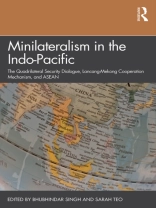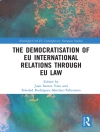While US-centred bilateralism and ASEAN-led multilateralism have largely dominated the post-Cold War regional security architecture in the Indo-Pacific, increasing doubts about their effectiveness have resulted in countries turning to alternative forms of cooperation, such as minilateral arrangements. Compared to multilateral groupings, minilateral platforms are smaller in size, as well as more exclusive, flexible and functional. Both China and the US have contributed to minilateral initiatives in the Indo-Pacific. In the case of the former, there is the Lancang-Mekong Cooperation mechanism-involving China, Cambodia, Laos, Myanmar, Thailand and Vietnam-established in 2015. In the case of the latter, there has been a revival of the Quadrilateral Security Dialogue in 2017-involving the US, Australia, Japan and India. This book examines the rise of these arrangements, their challenges and opportunities, as well as their impact on the extant regional security architecture, including on the ASEAN-led multilateral order.A valuable guide for students and policy-makers looking to understand the nature and development of minilateralism in the Indo-Pacific region.
Bhubhindar Singh & Sarah Teo
Minilateralism in the Indo-Pacific [EPUB ebook]
The Quadrilateral Security Dialogue, Lancang-Mekong Cooperation Mechanism, and ASEAN
Minilateralism in the Indo-Pacific [EPUB ebook]
The Quadrilateral Security Dialogue, Lancang-Mekong Cooperation Mechanism, and ASEAN
购买此电子书可免费获赠一本!
语言 英语 ● 格式 EPUB ● 网页 156 ● ISBN 9781000060027 ● 编辑 Bhubhindar Singh & Sarah Teo ● 出版者 Taylor and Francis ● 发布时间 2020 ● 下载 3 时 ● 货币 EUR ● ID 7994115 ● 复制保护 Adobe DRM
需要具备DRM功能的电子书阅读器












